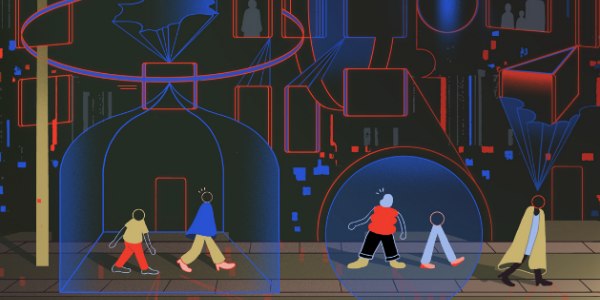From porch cameras to police states
It’s just a short step.

What happens in neighborhood where where porch cameras, local online communities and poor, if not homeless people coexist?
They can become “self-training camps for Surveillance States”, says N. Alang at The Walrus: Spaces like neighborhood-based Facebook groups can sure help newcomers to discover local hidden gems and even “something akin to neighbourliness”.
But the same online spaces can also catalyze more than the necessary amount of discussions around people deemed suspicious, especially when technology makes it much easier and affordable than even just a few years ago to create digital, but very concrete
“barriers policed by technology - by a growing array of cameras, by an explosion of online groups where people of a certain class warn of the presence of another."
Point is, as the full article explains in detail, such barriers are both less innocuous and less effective than they may seem:
- “Even if I could somehow catch an image of [someone who stoled a package on my porch], what then? Stalk the neighbourhood looking for both the culprit and a fight?"
Alang lists several real-world, ugly cases in which all these “opportunities” end up having the only practical effect, or untold rationale, of creating physically uneffective, but psychologically very satisfying “delineation between us and them”, that is the poor who dare roam the streets.
The three huge problems with technology like this:
(Besides being much less effective than it seems, that is)
- It is almost impossible to opt out once it has arrived.
- Sooner or later, it will be abused from above because, as Alang puts it, “it amounts to more data for those in power, be they police or politicians”
- Last but not least, and beyond what Alang exposes, there is a bigger problem: “neighborhood watches” are good, in principle, and very often in practice too. But when they are more digital than human, they just give people one more way to strenghten what I recently called their very own, but very dangerous “personal realities”.
Not good. Not good at all.
Who writes this, why, and how to help
I am Marco Fioretti, tech writer and aspiring polymath doing human-digital research and popularization.
I do it because YOUR civil rights and the quality of YOUR life depend every year more on how software is used AROUND you.
To this end, I have already shared more than a million words on this blog, without any paywall or user tracking, and am sharing the next million through a newsletter, also without any paywall.
The more direct support I get, the more I can continue to inform for free parents, teachers, decision makers, and everybody else who should know more stuff like this. You can support me with paid subscriptions to my newsletter, donations via PayPal (mfioretti@nexaima.net) or LiberaPay, or in any of the other ways listed here.THANKS for your support!